- All
- [Open Science Policies]
- Auvergne-Rhône-Alpes
- Bourgogne-Franche-Comté
- Brittany
- Centre-Val de Loire
- Corsica
- DROM-COM
- Grand Est
- Hauts-de-France
- Île-de-France
- Normandy
- Nouvelle-Aquitaine
- Occitania
- Pays de la Loire
- Provence-Alpes-Côte D'Azur
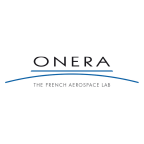
ONERA
ONERA’s mission:
- Developing and guiding research activities in the aerospace field
- Designing, developing and deploying the resources required to conduct this research
- Disseminating, in collaboration with the authorities or organisations responsible for scientific and technical research, the results of said research at national and international levels; promoting their use by the aerospace industry and, where appropriate, facilitating their application outside the aerospace field.
In these different capacities, it is notably tasked with:
- Conducting itself or asking a third party to conduct, on its own initiative or upon request, all the studies and research required by the aerospace industry
- Developing test and calculation facilities for the benefit of aerospace research and industry
- Liaising with French, foreign and international organisations whose activities may contribute to the advancement of aerospace research
- Disseminating and promoting the results obtained, in particular through publications, patents and operating licenses
- Promoting the launching or development of initiatives in favour of aerospace research or industry
- Assisting official organisations and authorities as an expert and upon request
- Contributing, in its field of competence, to the training policy on research and through research
In liaison with the National Centre for Space Studies, it contributes, through its own actions or through agreements, to research and experimental achievements in the space field.
Read more
Oniris
Oniris is an institute in higher education and research that operates under the aegis of France’s ministry of agriculture and food sovereignty.
Its work covers a broad spectrum of subjects that includes animal health and public health, clinical and biomedical studies, food science, and process engineering.
Oniris aims to be a player in the food industry and in animal and human health by actively contributing to the concept of ‘one medicine, one health’.
Oniris teaches around 1,200 students
Read more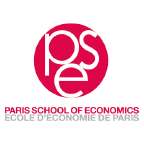
Paris School of Economics
Established in 2006 as a Foundation for Scientific Cooperation (Fondation de Coopération Scientifique) by the CNRS, the EHESS, the École des Ponts ParisTech, the École normale supérieure (ENS-PSL),the INRAE and the University Paris 1 Panthéon-Sorbonne, the Paris School of Economics comprises a community of nearly 150 researchers and 155 doctoral candidates.
The PSE conducts research and teaches economics courses at the highest international level. It actively encourages exchanges between economic analysts and the other social scientists, contributes to economic policy debates and makes its scholarly research accessible via its Partnership Programme and its actions “Economics for everyone”.
Read more
Rennes School of Business
Rennes School of Business is considered to be the most international School of Management in Europe. With 95% of faculty members being non-French, 55% foreign students, classes in English and a network of more than 350 partner universities worldwide, Rennes School of Business gives the students a unique opportunity to learn in a continuous international environment from first year to graduation.
Read more
Sciences Po
Sciences Po stands out for combining approaches and confronting different worldviews. This tradition of diversity and multidisciplinary approach makes Sciences Po an active participant in public debate, a forum where thought meets action.
At Sciences Po, the finest researchers in the social sciences engage in continual dialogue with the greatest practitioners. With an academic community of more than 4,000 academics including 2,400 practitioners, the knowledge we transmit to students is nurtured by innovative research and rooted in reality.
HAL Portal
Open Science Policy
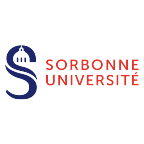
Sorbonne University
HAL Portal
Committment to Open Science
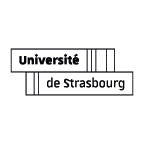
Strasbourg university
The University of Strasbourg is a research-intensive institution with a strong European identity. Its location on the border between France and Germany has led to a wealth of national and international partnerships.
HAL portal
Open science policy

TBS éducation
Formerly known as Toulouse Business School, TBS Education is a business school offering a range of management courses from Bac +3 to Bac +5. It is triple accredited by EQUIS, AACSB and EFMD.
The school has 4 campuses: two in Toulouse (Campus de Lascrosses and Campus d’Entiore), one in Paris, one in Barcelona in Spain (TBS Education Barcelona) and one in Casablanca in Morocco (TBS Education Casablanca).
The Research Centre brings together 6 laboratories working on academic management topics.
Read more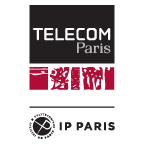
Télécom Paris
Télécom Paris is at the heart of a rich ecosystem. An IMT school, a founding member of the Institut Polytechnique de Paris. The School has been awarded labels for the quality of its training and research and works closely with partner schools.
Read more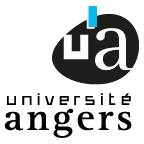
University of Angers
The University of Angers has strived to be a welcoming place for its students for over 10 years, to help them refine their career goals and to reach their potential. A recent survey has shown that a vast majority of students are happy to live and study in Angers.
The University of Angers offers 450 diplomas in every key discipline.
It started very early on creating quite original career-oriented courses. Today UA is the educational institution that has the highest number of vocational bachelor’s degrees in Western France. It is well established in the local region and works in close partnership with its socio-economic partners. With over 300 international partners across the globe and an ever-growing list of dual degrees, the University of Angers has a definite international dimension.
The University of Angers makes every effort to help its 25,000 students achieve academic success and find employment. For several years now it has had the highest pass rate in France for 3-year bachelor’s degree courses, thanks to its lecturers and researchers and to the measures implemented in favour of high school and university students.
At high school level the University of Angers has created a full package of measures to support future students in their training choices and foster their integration and success during their first year at university. UA is also working hard to guide its students when taking their first steps in higher education (through tutoring programmes, small-group work, continuous assessment…) and to help them with extra-curricular tasks (thanks to the InfoCampus desk where student advisors provide information on transport, accommodation, grants, etc.)
The Ip’Oline platform allows access to internships and job offers, as well as networking with other students, alumni, teachers and businesses. This approach clearly works since UA boasts a 90% employability rate 30 months after graduation.
Read more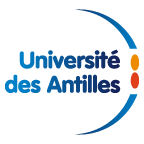
Université des Antilles
Université des Antilles is a public institution with a scientific, cultural and professional vocation, having evolved from the Université des Antilles et de la Guyane (created on March 1st, 1982) following the Loi du 25 juin 2015. It is located on two different areas, Guadeloupe and Martinique. 12.000 students attend this university.
Université des Antilles consists of:
- 17 training structures
- 25 research structures
- 2 postgraduate schools
- 3 disciplines
- 320 PhD students, including 41 foreigners
- 12.000 students
- 484 university lecturers and researchers
- 414 university library employees, engineers, administrative staff, technicians, health and social staff
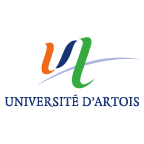
Artois University
Artois University is spread over several medium-sized towns of the Nord-Pas-de-Calais region and is composed of 8 Faculties, 2 University Institutes of Technology (IUT), a Further Education Department and 15 Research Centres.
Since its beginnings in 1992, Artois University has established itself as a major contributor to social mobility and has fostered a welcoming and stimulating environment favorable to both study and culture.
HAL portal
Open science policy
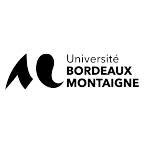
Bordeaux Montaigne University
Bordeaux Montaigne University brings together more than 14 000 students and 1 300 teaching and administrative staff, for study and research in the arts, languages, literatures and human and social sciences.
As a laboratory for ideas, and an intellectual hotbed, Bordeaux Montaigne University contributes meaningfully to the scientific debates of its day and works tirelessly to cultivate and nurture its fundamental values: independence, and freedom of thought. The university considers equality of opportunities to be one of its priority missions, and works permanently to perfect the courses it offers, and to support and guide its students towards success.
Now so more than ever before, Bordeaux Montaigne University seeks to follow in the path of Michel de Montaigne, continuing to offer a university model that is distinctly human in its scope and appearance. In accordance with the values that have characterised it since its very establishment, the university seeks to be: humanist, exploratory, polyglot, civic-minded, creative and digitally connected.
Read more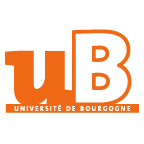
University of Burgundy
University of Burgundy fulfils a dual mission of education and research in all scientific fields.
Located in Burgundy between Paris and Lyon, the city of Dijon is home to uB’s main campus, with several others spread across the region.
It offers 400 different degrees across all levels (Bachelor, Master, and PhD), employs 3,000 staff members, and enrols 34,000 students, among whom more than 2,900 are international.
There are 27 Research Units divided into 6 main research fields :
- Food and Environment
- Health and Molecular Engineering
- Photonics and Advanced Materials
- Learning and Care
- Heritage and Territories
- Vine and Wine
HAL portal
Open Science Policy
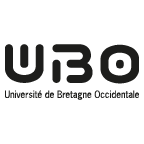
Université de Bretagne Occidentale
A public institution founded in 1971, UBO is a medium-sized university (around 23,000 students) offering a wide range of programmes in all fields. It is a member of the Université Bretagne Loire (UBL), a regional coordination structure for higher education.
French research is essentially academic in nature, encompassing the work of university laboratories and their partner organisations. UBO is home to 34 laboratories, some of which are supported by prestigious French research bodies, such as CNRS, INSERM, and IRD.
There are four principal areas of research at UBO :
- Marine Sciences
- Health, Agrifood and Materials
- Maths-ICT
- Humanities and Social Sciences
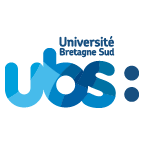
Université Bretagne Sud
Université Bretagne Sud is a public institution of a scientific, cultural and professional nature. Since 2020, it has been led by the president, Virginie Dupont.
UBS is a multidisciplinary institution that offers undergraduate, graduate and PhD courses in many fields: literature and languages, social sciences, engineering, computer sciences, mathematics, law, economics, business.
Read more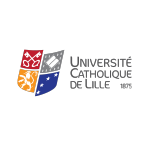
Université catholique de Lille
The Université Catholique de Lille was founded nearly 150 years ago. Its longevity results from a balance between what unites our institutions and what is at the basis of their singularities: their three academic missions: education, research, and service to society.
Research activities are supported by almost 850 teachers, researchers and university hospital staff and more than 200 doctoral students. Their activities cover more than 60 academic disciplines and are carried out within 12 research units, either under their own auspices or under joint supervision, in particular with the CNRS.
Read more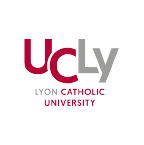
Lyon Catholic university
Lyon Catholic University was founded in 1875 and combines respect for Christian heritage with a spirit of openness. With its location at the heart of the regional capital, its close ties to business and strong international links, it seeks to promote academic excellence, creativity and integrity.
8 single or multidisciplinary research groups are gathered within the CONFLUENCE Sciences and Humanities Research Center. They include all UCLy’s affiliated researchers in their activities.
Read more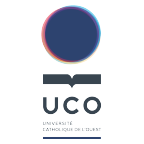
Université catholique de l’Ouest
Established in 1875, Université catholique de l’Ouest is one of the oldest universities in Western France, and a major actor in today’s higher education and research ecosystem.
This multidisciplinary university hosts 12.100 students in its campuses, in Western France and overseas; it offers over 100 training programs.
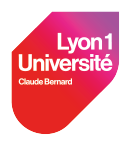
University Claude Bernard Lyon 1
A university at the cutting edge of innovation, Lyon 1 delivers high quality education and research excellence within an attractive environment. Its international reach extends through the fields of science, technology, health and sport. Lyon 1 is also a university that is committed to support, creation and sharing with respect to everyone within its community.
Read more